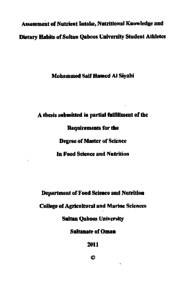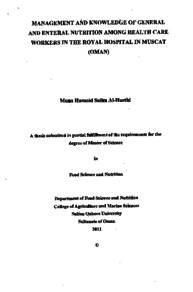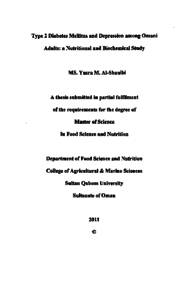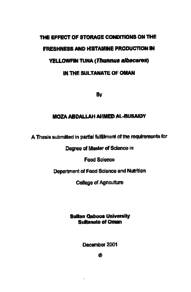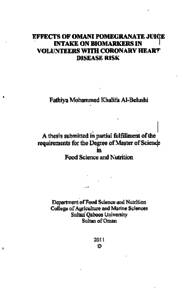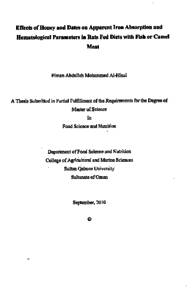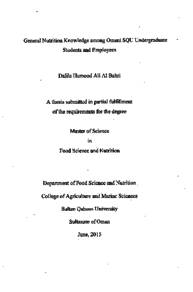وثيقة
Assessment of nutrient intake, nutritional knowledge and dietary habits of Sultan Qaboos University student athletes
الناشر
Sultan Qaboos University
ميلادي
2011
اللغة
الأنجليزية
الموضوع
الملخص الإنجليزي
Optimum nutrient intake and good nutritional knowledge have been recognized by many researchers to be the most important factors for athletes. The aim of this study was to assess the nutrient intake and nutritional status as well as the nutritional knowledge and dietary habits of Sultan Qaboos University (SQU) student athletes. A cross-sectional research design was used for this study. A total of 71 (49 male and 22 female) student athletes from the Department of Physical Education, College of Education, Sultan Qaboos University, participated in this study. The age of the athletes ranged between 18 to 27 years with a mean age of 19.32 $ 0.72 years for females and 21.0 + 1.81 for males. A study questionnaire consisting of 2 sections was distributed to the participants. The dietary intake of participants was collected by using a 7-days food diary intake record identifying the frequency as well as the variety of food consumption. The results indicated that the mean body mass index (BMI) of females was 20.34 $2.97 kg/m2 and for males was 22.51 + 1.98 kg/m2. The athletes were classified within the normal BMI group (18.5 - 24.9 kg/m,). The main sources of nutrition information used by the female athletes were the family and friends (31%), books and magazine (28%) and TV (20%), while the male athletes relied mainly on family and friends (28%), books and magazine (27%), lecture (15%) and TV (15%). Both male and female athletes had the minimum information from dietitians and physicians (7%) and (10%) respectively. Significant (P <0.05) differences were observed in the nutritional knowledge and dietary habits scores of male and female athletes, which were 57 % and 49 %, respectively. Male athletes had fair nutritional knowledge, whereas the female athletes were classified to have poor nutritional knowledge and dietary habits. The average daily energy intake of male athletes was 2595 + 358.18 kcal/day. Carbohydrate, fat, and protein contributed 64%, 22%, and 14%, of the total energy intake of the male athletes, respectively. Energy and macronutrients intake of the male athletes was within the recommended intake. Our findings suggest the need for developing strategies to improve the nutritional knowledge and dietary habits of university athletes. There is a clear need both in counseling and teaching for improving the nutritional knowledge and dietary habits of our athletes. Further research is needed to identify the dietary requirements matching to their physical activities and strategies to improve the performance of university athletes.
المجموعة
URL المصدر
الملخص العربي
أكد معظم الباحثين بأن التغذية المثالية والمعرفة الجيدة بالغذاء هما من أهم العوامل للرياضيين. وكان الهدف من هذة الدراسة هو تقييم كمية المواد الغذائية والتغذوية وكذلك المعرفة الغذائية والعادات الغذائية للطلاب الرياضيين . وكان الهدف من بجامعة السلطان قابوس. وقد تم إستخدام إسلوب الدراسة العرضية لتصميم بحث هذة الدراسة. وقد شارك في هذه الدراسة ۷۱ طالبا (4۹ من الذكور و ۲۲ من الإناث من قسم التربية الرياضية لكلية التربية بجامعة السلطان قابوس. و تراوحت أعمارهم بين 18 إلى ۲۷ سنة بمتوسط عمر ۱۹ . ۲۳ + ۷۲.. للإناث و ۱۱ . ۰ + ۱ . ۸۱ للذكور. تم توزيع إستبيان الدراسة الذي يتكون من قسمين على المشاركين. كذلك قامت الدراسة على جمع معلومات عن كمية و نوعية الطعام الذي تناوله المشاركون لسبعة أيام ماضية حدده الباحث. وأشارت النتائج إلى أن متوسط مؤشر كتلة الجسم (BMI) للإناث ۲۰ . ۳۶ + ۲ . ۹۷ وللذكور ۲۲ . ۵۱ + ۱ . ۹۸ وقد تم تصنيف مؤشر كتلة الجسم للرياضيين بأنه طبيعي. وقد كان المصدر الرئيسي للمعلومات الغذائية العائلة و الأصدقاء (۳۱%)، الكتب والمجلات (۲۸%) والتلفاز (۲۰%) بالنسبة للإناث أما مصدر المعلومات الغذائية للذكور إعتمد كليا على العائلة و الأصدقاء (۲۸%)، الكتب والمجلات (۲۷%)، المحضرات (۱۰%) والتلفاز (۱۱%). ويستمد الرياضيون ذكورا وإناثا معلوماتهم بشكل ضئيل جدا من أخصائين التغذية، و الأطباء (97) و (۱۰%) على التوالي. كذلك أشارت النتائج لوجود فرق واضح ( 0 . 05 >p) في المعلومات الغذائية و العادات الغذائية لدى كلا من الذكور والإناث والتي كانت 57 % و 49 % على التوالي. وتم تصنيف المعرفة الغذاية و العادات الغذائية لدى الذكور بأنها مقبولة أما بالنسبة للإناث فكانت ضعيفة. أما بالنسبة لمتوسط كمية الطاقة اليومية للرياضيين الذكور فكانت ۲۰۹۰ + ۳۰۸ . ۱۸ كيلو كالوري يوم. وقد ساهم كلا من الكربوهيدرات و الدهون والبروتين بنسبة ۹۶ ، % ۲۲ ، و14 % من إجمالي كمية الطاقة الرياضيين الذكور ، على التوالي. و قد كان كلا من الطاقة و كمية المغذيات في حدود الكمية الموصى بها. وفقا لهذه النيائج نقترح الحاجة لتطوير إستراتيجيات لتحسين المعرفة الغذائية والعادات الغذائية للرياضيين. كما إن هناك حاجة لإجراء مزيدا من البحوث لتقييم و تحديد الإحتياجات الغذائية المطابقة للإنشطتهم البدنية وإسترتيجيات لتحسين أداء الرياضيين بالجامعة.
قالب العنصر
الرسائل والأطروحات الجامعية

